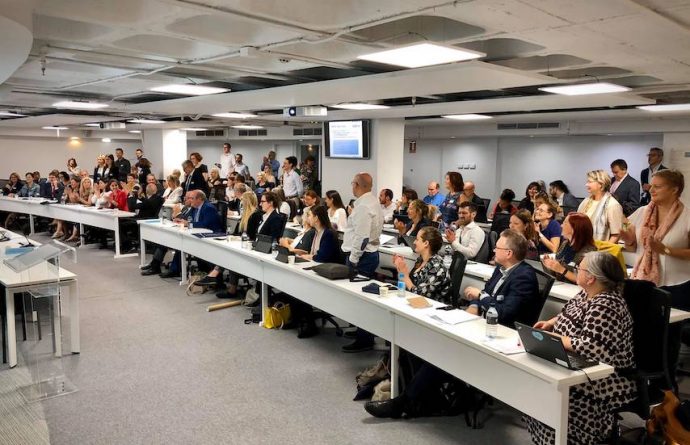Communication
Website
The website has always been EQAR’s main communication tool to address its target audiences. Largely as a result of DEQAR, a substantial increase of visitors was noted in 2019, resulting in over 48 000 visits, doubling the figures of 2018 (24 000).
The statistics show that the main focus of visitors now clearly shifted from the list of the registered quality assurance agencies and related information (“Register” section) to the Database of External Quality Assurance Results (DEQAR, “Database” section). Over 35% of all page views was on the DEQAR pages, followed by 26% on the Register pages and 13% on the Knowledge Base, both of which are linked from the database via the agency and country information.
Newsletters and social media
EQAR issued four newsletters in 2019, reaching nearly 600 recipients.
Newsletter topics included information about the decisions of the Register Committee, external QA activities of EQAR-registered agencies, relevant policy updates and documents with regard to QA and the use of EQAR in the national QA frameworks of the EHEA countries, DEQAR updates as well as organisational updates.
EQAR also remained active on social media, including Twitter, LinkedIn and, to a lesser extent, Facebook. In 2019, 46 tweets led to a total of 109 000 impressions (number of times users saw the tweet on twitter) and 1 499 engagements (number of times a user has interacted with a tweet). EQAR’s followers amounted to around 1 300.
Publications and promotion
- The EQAR Annual Report 2018 was published on the EQAR website in June and was announced in the newsletter as well as on social media. Since 2018, the Annual Report is published online only.
- In the framework of the DEQAR project, two pilot studies were published by the University of Ghent – the Centre for Higher Education Governance Ghent (CHEGG). The first Pilot Study explored how aspects of programme design, approval and monitoring are present in institutional external quality assurance reports across different national contexts. The second Pilot Study, focused on how standards related to student-centred learning are interpreted in a cross-border QA context. Read more in the annual report chapter on DEQAR or on the website “Pilot studies“.
- DEQAR flyers were created, published and distributed at events. Presenting a quick, bulleted overview of “What, Why, for Whom and How” it also includes two user testimonials and thus provides easy to read, complete, but concise information for those with little knowledge of DEQAR.
- DEQAR explainer video: this video was created to explain and promote the whats and whys of the database in an easy to understand, engaging way and lasts just 1,5 minutes. Special mini-videos (loops) targeted to different audiences were also created, specifically as attachments for social media.
Representation and Relations with Members and Partners
At the EQAR Members’ Dialogue that took place in Madrid (October 2019), the programme focused not only on DEQAR but also on current policy developments in European higher education and quality assurance, e.g. the European Universities initiative.
EQAR was represented in major conferences and seminars concerned with quality assurance of higher education. Many of these conferences were (also) used to promote the Database of External Quality Assurance Results (DEQAR) to the diverse user groups through presentations, parallel sessions and workshops. DEQAR received keen interest as a new initiative enhancing the information provided by EQAR significantly.
EQAR staff also had several bilateral meetings with members, quality assurance agencies and other interested parties, either as delegation visits to the EQAR office or visits from EQAR representatives to other organisations.
